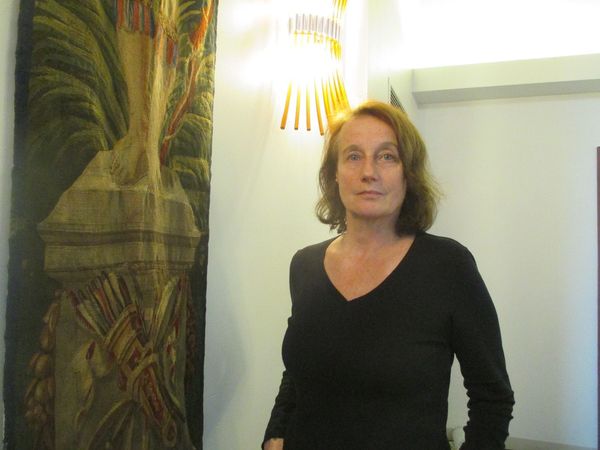 |
| Caroline Champetier on Barbara Sukowa as Hannah Arendt in Margarethe von Trotta's film: "I thought it was a beautiful ingenious idea to give her this part." Photo: Anne-Katrin Titze |
Cinematographer Caroline Champetier has worked with Benoît Jacquot, Xavier Beauvois, Jacques Rivette, Arnaud Desplechin, Anne Fontaine, Cédric Anger, Jacques Doillon, Leos Carax, André Téchiné, Barbet Schroeder, Philippe Garrel, Patricia Mazuy, Chantal Akerman, Danièle Huillet and Jean-Marie Straub, Claude Lanzmann, and Kevin Macdonald on his Howard Hawks documentary. Her films with these directors include La Fille Seule, Of Gods And Men, Le Pont Du Nord, La Sentinelle, Tokyo! with Denis Lavant, The Innocents, Le Tueur, Ponette, Alice Et Martin, Terror's Advocate, Night Wind, Of Women And Horses, Toute Une Nuit, Too Early/Too Late, and The Last Of The Unjust respectively.
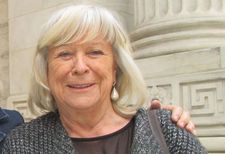 |
| On Margarethe von Trotta: "She had exactly the idea for the beginning of the movie." Photo: Anne-Katrin Titze |
The afternoon following Caroline Champetier's presentation of The Innocents and Holy Motors during the CinéSalon tribute to her career, co-curated with Delphine Selles-Alvarez at the French Institute Alliance Française in New York, we spoke about how she sees Hannah Arendt, Of Gods And Men and The Innocents, the spirit of place in The Last Of The Unjust, the collaboration between Margarethe von Trotta, Pam Katz and Barbara Sukowa, and why evil is a great subject to collaborate on with a director "who wants to fight with that."
Hannah Arendt begins with the arrest of Adolf Eichmann, the former chief of the Gestapo's Jewish Office, at night, on a country road in Argentina in May 1960. A flashlight segues into the lighter Arendt uses to light a cigarette. Barbara Sukowa plays Arendt, "the thinker," with finesse and tough delicacy.
Margarethe von Trotta focuses on the years surrounding the Eichmann trial in Israel in 1961, which Arendt covered as a reporter for The New Yorker. She uses the actual footage of the trial and thus avoids having an actor play Adolf Eichmann - a brilliant decision. She does not try to blend the two levels, but has Sukowa, smoking and typing, mostly in the press room, react to the real film footage in black and white on a monitor. Observing Eichmann, who possessed the "horrible gift for consoling himself with clichés" gave Arendt the opportunity to explain the connection of language and conscience. Her use of "banality", the film makes very clear, must not be mistaken for innocence. Evil hides in plain sight.
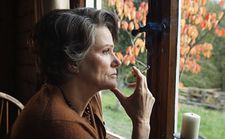 |
| Barbara Sukowa as Hannah Arendt: "A little to the brows and the hair - and she was herself." |
Anne-Katrin Titze: I found it stunning how Hannah Arendt was put together. How much takes place in her apartment in New York. How much we see the private Hannah. You'd think it's about Eichmann and the trial.
Caroline Champetier: It was in the script. It was really a very good script. I think Margarethe von Trotta worked four years on that script with an American girl ...
AKT: Pam Katz.
CC: Who is a very strong writer. Definitely, reading it, it was a good script. So you can go blind to shoot something like that. Also working with such a great artist, actress, like Barbara Sukowa. I thought it was a beautiful ingenious idea to give her this part of Hannah Arendt. It was difficult to find the look, to find the nose, to find the hair.
AKT: The eyebrows even. I noticed the spotty eyebrows and the helmet hair.
CC: Yes. At one time we said, no, never mind for the nose. We are not going to make a fake nose and things like that. Just, as you say, a little to the brows and the hair - and she was herself. And I think it was better for her.
AKT: I think the transformation is remarkable. Barbara does look so very different in real life.
_225.jpg) |
| On Theresienstadt: "For The Last Of The Unjust, I have been to this place with Claude Lanzmann three times." Photo: Anne-Katrin Titze |
CC: First I think the friendship between these two women is really important to achieve a work like that. Margarethe trusting Barbara and Barbara trusting Margarethe. And then, of course, the cleverness and the admiration for Hannah Arendt.
When the subject of a movie - and it's the same for Of Gods And Men and it can be the same for The Innocents by Anne Fontaine - when the level and the story is very high, you have to make yourself higher to join the subject.
AKT: You raise yourself to the level.
CC: And this was the question of this movie of Hannah Arendt.
AKT: To elevate yourself to the level of these people?
CC: Yes. Of these people, of this subject. Of the questions the subjects are asking. Of course, I trust that. I really deeply think that when the subject and the story asks something spiritual from you, you go higher with your work.
AKT: It's clear that these questions interest you. You have for example in several of your films the idea of evil. Not just in the three films we mentioned. I'm also thinking of Claude Lanzmann and The Last Of The Unjust. I'm thinking of Barbet Schroeder and Terror's Advocate. Is the subject of evil something you feel you have to do, that draws you in?
_225.jpg) |
| On evil and Terror's Advocate director Barbet Schroeder: "I can be the good colleague." Photo: Anne-Katrin Titze |
CC: It's a great subject. And it's the director who wants to fight with that. I'm not alone with the subject. There is a director for this. So I can be the good colleague. I can be the good guy to be with them.
AKT: In The Last Of The Unjust, you were filming Claude Lanzmann on the train station platform and in Theresienstadt?
CC: Yes.
AKT: This is one of the films where the spirit of place is immensely important. It transcends from the screen. I've rarely experienced a place that strongly this way.
CC: Theresienstadt is a very very special place. When you go to the place you understand everything. It's a Kaserne [barracks], it's made for the army. Then when you understand all these people were put here, the place is giving something to you.
After that, the trick is to make that understandable with the camera, with the shot. It's the same in the convent of The Innocents, it's the same in the Atlas [mountains], in the convent, of Of Gods And Men.
You have to feel the place when you are a DP. Of course you have to feel the characters, you have to feel the body of the actor, but you have to feel the place. And to feel the place is spending time before the shooting, during the shooting. For The Last Of The Unjust, I have been to this place with Claude Lanzmann three times.
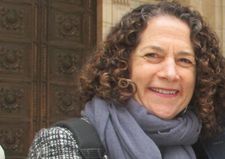 |
| Hannah Arendt co-screenwriter Pamela Katz: "It was really a very good script." Photo: Anne-Katrin Titze |
Because I have been to this place with [William] Lubtchansky and Claude Lanzmann when we were shooting Shoah [Les Juifs De Pologne, Des Pogroms à La Shoah], then we come back to this place, then we come back to shoot Last Of The Unjust. You see it's like a place - you come back to it to understand what is - not the secret. Because there is no secret of the place. But to be in it and to understand what you feel being in these streets which are so rigid.
AKT: Did it ever happen that you felt you couldn't get the spirit of place on camera? That something escaped you?
CC: Perhaps. I don't remember exactly, but perhaps. You see, in fiction, an actor has not this time to spend a long time in the place. He is coming, he is playing his part, he is going away. But when you are scouting and preparing a movie, you have time. And you have time to look at the light, you have time to be with, to live with, the place.
AKT: How did you prepare for Hannah Arendt?
CC: I looked at a lot of pictures and photos during the scouting time and I saw a lot of videos and on the internet, speeches of Hannah Arendt, things like that.
AKT: Of her? There were no other film references that Margarethe von Trotta wanted you to look at?
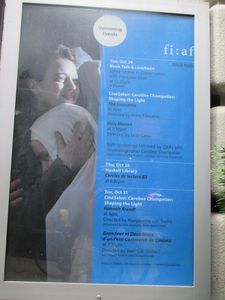 |
| Cinematographer Caroline Champetier: Shaping The Light poster - French Institute Alliance Française Photo: Anne-Katrin Titze |
CC: Not so much movies. Just Hannah Arendt explanations, conferences and so on.
AKT: There is the very interesting decision to have the Eichmann trial in the original footage and not have an actor play Eichmann. The black and white footage is combined with the reactions in the audience and press room, filmed by you.
CC: It's a beautiful idea.
AKT: I think it's brilliant to do it this way.
CC: Yes, it's a Margarethe idea. It's a beautiful, beautiful idea. When you know you have the material for that, you are not going to take an actor. We have just an actor for the first sequence when he is arrested. It's just a body in the night.
AKT: The beginning is great. It's headlights, it's like an animal. You think it's a puma or something coming towards you.
CC: And Margarethe was very clear about this very first picture [image]. She described to me exactly, I think, as it is in the movie. She had exactly the idea for the beginning of the movie.
Coming up - Caroline Champetier on Anne Fontaine's The Innocents, Arnaud Desplechin's La Sentinelle, Jacques Rivette, Benoît Jacquot, Kevin Macdonald and Howard Hawks, working with Leos Carax and Denis Lavant on Holy Motors and Tokyo!, and more.
Cinematographer Caroline Champetier: Shaping the Light upcoming screenings:
On Tuesday, October 31 at 4:00pm, Anne-Katrin Titze will introduce Hannah Arendt and at 7:30pm, Richard Brody, the author of Everything Is Cinema: The Working Life of Jean-Luc Godard, will introduce Godard's Grandeur Et Décadence D'Un Petit Commerce De Cinéma.
Cinematographer Caroline Champetier: Shaping the Light runs through October 31 at the French Institute Alliance Française in New York.





















